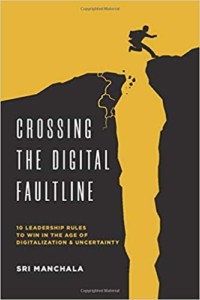Title: Crossing the Digital Faultline: 10 Leadership Rules to Win in the Age of Digitalization and Uncertainty
Author: Sri Manchala
Publisher: Trasers Publishing
ISBN: 978-1-7351574-3-6
Genre: Business
Pages: 288
Reviewed By: Dan MacIntosh
Pacific Book Review
Author Sri Manchala includes a startling statistic at the start of his book about our world’s increasing digitalization. Even though it should be extremely obvious to most people – especially business leaders – our world is speeding headlong into nearly complete digitalization of all industries of which only 7% of companies across industries succeed at digitalization. You don’t need to be any math wiz to recognize that a full 93% of contemporary companies are not succeeding at digitalization. That’s scary!
Of course, many industries received a rude awakening to the digital age and were forced – by hook or by crook – to get right with the times, so to speak. An obvious example is the music business. Although, technically, CDs are still manufactured and sold, very view consumers actually purchase physical CDs these days. In fact, the MP3, which killed the compact disc, is itself an endangered species now, as streaming services, such as Spotify and YouTube, are more the music consumption method choice for most music listeners now. The music industry was forced to react, and react quickly, and is still trying to get caught up to the digital changes in that entertainment field.
Yes, the above illustration is an obvious example. We all know about it because, to a greater or lesser degree, we’re all music consumers. We’re also aware of companies such as Netflix and Amazon Prime because we all watch movies and TV programs. However, Manchala’s book is not directed to these well-known entertainment industries. Those are industries that needed to adapt to digitalization because the very nature of their products changed into digital releases. No, the thrust of Manchala’s book is aimed at industries which may not yet realize that digitalism is coming for them as well. He mentions dinosaurs in this book that failed to see the coming wave of digital transformation. One of these is Blockbuster, which placed a higher premium on its brick and mortar stores, than the companies very survival, and was left in the exhaust of Netflix’s smart transformation from a DVD rental company, to a streaming service that also produces original content.
Manchala is the Charmain and CEO of Trianz, which he founded in Silicon Valley to be a digital transformation service, in 2001. Many of the examples he refers to in his book are based upon actual client experiences. Having personal experience with companies either excelling or flailing at transforming themselves digitally, gives his insight extra weight. Manchala not just giving us his opinions; he’s describing what he’s done and seen in the business world.
This book is relevant because it’s also right up to date. In fact, many of these chapters include sections about Covid-19, and how that pandemic has affected the business world. Without these sections, the reader might well wonder, ‘All this is well and good, but how is Covid-19 impacting these various institutions?’ Manchala has already taken this unusual and unexpected societal wrinkle into account.
Manchala draws the title for his book from an experience he had while on a business trip in Japan. He was in Tokyo in March of 2011 when that country was struck with a massive earthquake. The author realized right then that digital transformation was a lot like an earthquake’s fault line, in that if you’re not prepared for what can happen with major changes, you can become a victim to a catastrophe. Manchala was also encouraged by how seemingly calmly the Japanese people responded to this natural disaster. This is how business leaders also need to respond to sudden changes in their industries, such as digitalization.
This is by no means any sort of a philosophical book, just as it isn’t a collection of Manchala’s personal opinions. Instead, it is a practical ‘how to’ guide for leaders that realize they must change or be left behind. Mankind is still a long way from being able to accurately predict earthquakes in a timely manner. If we could know, say, hours before an earthquake was about to strike, we could at least prepare by putting ourselves it the safest place possible. Manchala is sounding the alarm about digital technology’s current shake-up. There is no excuse not to know about it, according to Manchala. It’s as if his book is saying, ‘The time is now to change, or be left behind.’ If you’re a business leader, this is Manchala’s warning to you. Take heed of it.



Follow Us